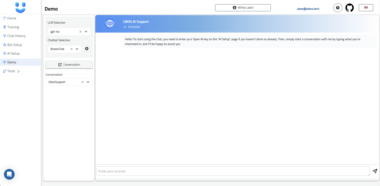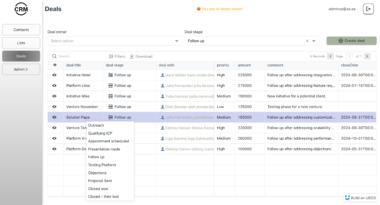Revolutionizing Travel Planning with MCP-Powered AI: An In-Depth Look at the Tour Operator System
In today’s rapidly evolving digital landscape, the travel industry is undergoing a profound transformation, driven by the power of Artificial Intelligence (AI) and advanced technologies. At the heart of this transformation lies the Model Context Protocol (MCP), an open protocol that standardizes how applications provide context to Large Language Models (LLMs). By leveraging MCP, developers can create more intelligent and context-aware travel planning solutions that enhance the user experience and streamline operations.
The Tour Operator System (TOS), a web application designed to help users search for flight information and, potentially in the future, hotel bookings, exemplifies the transformative potential of MCP in the travel sector. This project seamlessly integrates with the Amadeus API, a leading provider of real-time travel data, to provide users with a user-friendly interface for planning their trips. The frontend is built with React and styled with Bootstrap, while the backend is a Node.js/Express server, ensuring a robust and scalable architecture. Furthermore, the entire application is containerized using Docker, simplifying development and deployment.
Key Features and Functionalities
The Tour Operator System boasts a comprehensive set of features and functionalities that cater to the diverse needs of modern travelers. Let’s delve into some of its most notable capabilities:
Flight Search: The system empowers users to search for both one-way and round-trip flights, providing them with the flexibility to plan their journeys according to their preferences. Users can specify their origin and destination using IATA codes, select their departure and (optional) return dates, and indicate the number of adult passengers. Additionally, the system allows users to select their preferred currency for flight prices, ensuring a seamless and personalized experience.
Results Display: The system presents flight offers with total prices, enabling users to quickly identify the most suitable options for their budget. It also displays airline logos (PNG format, locally hosted), adding a touch of visual appeal and enhancing the user experience. The itinerary details include flight segments, departure/arrival times, airline codes, and flight numbers, providing users with comprehensive information about their flights. Moreover, the system gracefully handles missing airline names or aircraft details if backend dictionaries are unavailable, ensuring a smooth and uninterrupted user experience.
User Interface: The user interface is built with React and
react-bootstrap, providing a modern and intuitive look and feel. The responsive layout ensures that the application adapts seamlessly to different screen sizes, providing an optimal viewing experience across all devices. Google Maps integration further enhances the user experience by displaying the origin and destination on a map (currently dependent on Amadeusincludeparameter functionality).Backend API: The Node.js/Express server provides endpoints for health checks and flight offer searches via the Amadeus API. It also handles Amadeus API key management via environment variables, ensuring secure and efficient access to travel data.
Development Environment: The fully containerized development environment, utilizing Docker and Docker Compose for the frontend, backend, and optionally PostgreSQL, Redis, and PgAdmin, simplifies the development process and ensures consistency across different environments.
Use Cases and Applications
The Tour Operator System has a wide range of potential use cases and applications in the travel industry, including:
Online Travel Agencies (OTAs): OTAs can integrate the system into their platforms to provide users with a comprehensive flight search and booking experience.
Travel Management Companies (TMCs): TMCs can use the system to streamline their flight booking processes and provide their corporate clients with a user-friendly travel planning tool.
Airlines: Airlines can leverage the system to allow customers to search for and book flights directly on their websites.
Travelers: Individual travelers can use the system to plan their personal trips and find the best flight deals.
The Power of UBOS: Enhancing AI Agent Development for Travel
UBOS is a full-stack AI Agent development platform that empowers businesses to orchestrate AI Agents, connect them with enterprise data, and build custom AI Agents with their LLM models and Multi-Agent Systems. By integrating UBOS with the Tour Operator System, developers can unlock new levels of intelligence and automation, leading to enhanced user experiences and streamlined operations.
Here are some ways UBOS can enhance the Tour Operator System:
Intelligent Recommendations: UBOS can analyze user data, such as past travel history and preferences, to provide personalized flight recommendations. This can significantly improve the user experience and increase booking conversions.
Automated Customer Support: UBOS can power AI-powered chatbots that provide instant customer support, answering questions about flights, booking processes, and travel policies. This can reduce the workload on human agents and improve customer satisfaction.
Dynamic Pricing Optimization: UBOS can analyze real-time market data and adjust flight prices dynamically to maximize revenue. This can help airlines and OTAs optimize their pricing strategies and increase profitability.
Fraud Detection: UBOS can detect and prevent fraudulent bookings by analyzing user behavior and identifying suspicious patterns. This can protect airlines and OTAs from financial losses.
Technical Deep Dive
The Tour Operator System leverages a modern tech stack to ensure performance, scalability, and maintainability. Here’s a closer look at the key technologies used:
Frontend: React, JavaScript, Axios,
react-bootstrap,bootstrap,@react-google-maps/api(for map), local PNG airline logos.Backend: Node.js, Express.js, Amadeus Node SDK.
API Integration: Amadeus Self-Service APIs.
Containerization: Docker, Docker Compose.
Environment Management:
.envfiles.
This combination of technologies provides a solid foundation for building a robust and scalable travel planning solution.
Overcoming Challenges and Embracing Future Enhancements
The Tour Operator System is currently facing some challenges, such as the issue with the Amadeus include parameter, which prevents the fetching of location coordinates, full airline names, and aircraft details. However, the development team is actively working to resolve this issue and implement future enhancements, including:
Location Autocomplete: Implementing IATA code lookup for origin and destination fields using the
/api/locations/searchbackend endpoint.Hotel Search Module: Adding functionality to search and display hotel information.
Multi-City Flight Search: Expanding the flight search capabilities to support multi-city itineraries.
User Accounts & Bookings: Implementing user authentication and a booking management system.
Advanced Filtering & Sorting: Adding advanced filtering and sorting options for flight results.
UI/UX Refinements: Continuously improving the user interface and user experience.
Deployment to a Cloud Platform: Deploying the application to a cloud platform (e.g., Railway, Google Cloud Run) for increased scalability and reliability.
Conclusion
The Tour Operator System, powered by MCP and potentially enhanced by UBOS, represents a significant step forward in the evolution of travel planning. By leveraging AI and advanced technologies, this system provides users with a seamless and personalized experience, while also streamlining operations for travel industry stakeholders. As the travel industry continues to embrace AI, solutions like the Tour Operator System will play an increasingly important role in shaping the future of travel.
Tour Operator System
Project Details
- SSaksit23/adventureconnect
- Last Updated: 6/12/2025
Recomended MCP Servers

Twitter MCP Tool

TEST

Model Context Protocol (MCP) server for using the Eyevinn Open Source Cloud API

Starter files, final projects, and FAQ for my Ultimate React course

ChatTTS is a generative speech model for daily dialogue.


Analytical MCP Server: Enhancing AI with Structured Problem-Solving Tools

This project demonstrates how to use Cloudflare Browser Rendering to extract web content for LLM context. It includes...
 From vibe coding to vibe deployment. UBOS MCP turns ideas into infra with one message.
From vibe coding to vibe deployment. UBOS MCP turns ideas into infra with one message.





